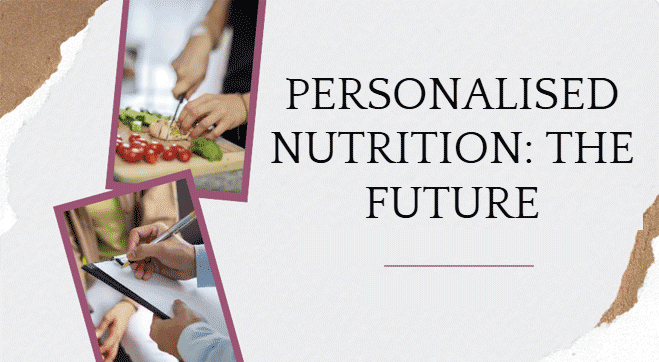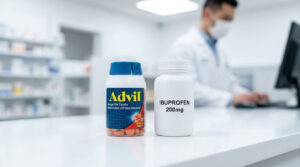We’re seeing countless conversations about how AI is changing the world around us—and undoubtedly, it hasn’t spared the nutrition industry either, because why not? AI in nutrition is a game changer!
The shorter answer might lie in the reason someone hires a nutritionist in the first place: personalised nutrition plans. However, there are many other facets to the subject. In this article, we will discuss how, with AI in nutrition, dieticians and other healthcare professionals can now quantify your nutritional requirements and design better personalised diets to meet those unique requirements. And that’s just the tip of it. There’s a lot more.
The Shift Towards Personalised Nutrition
Before we discuss the shift towards personalised nutrition, we must first understand what it means exactly. Recent years have taught us that every individual’s dietary needs are different based on their environment, the genes that were passed on to them, their lifestyle choices, and their current health status.
So, with all that context in mind, traditional nutrition plans simply do not cut it anymore, as they can’t account for such minor nuances. Therefore, the constantly evolving science of nutrition acknowledges the fact that all of our needs are unique and cater specifically to them.
But was this just an isolated phenomenon, or were other factors that led up to this change? If the latter is true, then what are these other factors that are driving this positive shift towards the integration of AI in nutrition?
- Increasing prevalence of lifestyle disorders: Ever wondered why every second person you meet seems to be a diagnosed diabetic or a hypertensive on medication? One of the reasons for this increased prevalence is the shift towards modern lifestyle habits and the consumption of ultra-processed food, in fact. Such chronic health conditions are now beginning to be referred to as lifestyle disorders. This has created a demand for personalised nutrition plans that adjust for these lifestyle disorders and the medications they’re on. 1
- Consciousness among consumers: With the dramatic increase in information sources available, more and more consumers are becoming health-conscious and are starting to seek out alternatives that cater to their individual preferences and fitness goals. Personalised nutrition plans aim to service exactly these needs by creating highly customisable diet plans.
- Advancements in dietetics: With Big Data and AI entering the fold, the health and wellness sector is undergoing a cultural revolution of sorts. What is the utility of such advancements, you ask? These technological innovations allow dieticians to study dietary patterns and nutritional genomics more astutely and help convert that knowledge into actionable insights. 2
Role of Genetics in Modern Nutrition
Before we get to discussing the role of genetics in modern nutrition, let’s first try to understand how genetically transferable traits can influence our dietary habits. Firstly, genetic variations can be responsible for different people possessing different rates of metabolism. What this means is that the rate at which you’re able to turn the food you consume into energy can vary depending on the rate of metabolism in your body.
Genetic variations can also impact how our body absorbs both vital macronutrients and micronutrients. Let’s try to understand this by using a real-life clinical scenario. An individual suffering from a condition called hereditary fructose intolerance does not have an enzyme called aldolase B in their body. This enzyme is essential for breaking down fructose, a complex sugar molecule present in most fruits and juices. So, it becomes imperative to ensure that the diet of such individuals contains little fruits or other substances known to trigger symptoms. Genetic testing for diets becomes vital in individuals with such inborn errors of metabolism. 3
AI’s Role in Nutrition Planning
Ever thought about the growing role of AI in modern nutrition? Well, turns out the answer to that question is multifold; its scope currently extends to:
- Dietary assessment: Before you can come up with a personalised nutrition plan, it’s important to identify what your nutritional needs are, assess how much of it is your intake, and finally figure out if there are any key inadequacies. The advantage of using AI-driven dietary assessment tools is that they’re able to achieve this in a fraction of the time that traditional tools would normally take. Moreover, they’re able to recognise and process image-based data at a much faster rate as well.
- Personalised nutritional recommendations: The biggest advantage of using AI in nutrition is that they’re able to comb through tons of data to establish relationships between your eating habits and what adverse health effects can be seen. This information is critical in creating personalised nutritional plans based on unique DNA profiles.
AI and Genetics Working Together
Does the idea of AI and genetics working together seem novel to you? The truth is that collaboration between AI and genetics has been happening for a while now, and it seems to be reaping a lot of the rewards. Sophisticated data analytical tools help in the processing of complex data sets, uncovering hidden patterns within them, thus helping scientists understand disease causation at both a micro and a macro level. The scope of AI in genetics is currently going beyond data analysis, with such tools being used in the creation of entire genomes from scratch.4
Benefits of AI and Genetics in Nutrition
One of the most exciting applications of AI and genetics in nutrition is the development of predictive models. Factoring in lifestyle choices, dietary habits, and supposed nutritional gaps, it’s now possible to predict health trends and identify the population that would be at the most risk of developing adverse outcomes.
Why are experts saying that this is integral in the world of public health legislation? Available resources can now be allocated accordingly, with the protection of such vulnerable populations becoming the priority for governments worldwide.
Yet another benefit of AI and genetics in nutrition is that it provides real-time insights based on your eating habits. This means that you can now take proactive steps by adjusting your personalised nutrition plans to ultimately attain the health goals that you’d set for yourself.
Challenges and Ethical Considerations
If you thought that the road ahead for AI in nutrition is smooth and without any curveballs, then you’re wrong. There are several challenges and ethical considerations that come with integrating this technology into our daily lives. Some of these include:
- Data privacy: The use of AI in nutrition will require massive amounts of information to be collected from all individuals. If this is raising any red flags in your head about data security, then you are completely justified in thinking so. The possibility of a data breach and such sensitive information being misused cannot be ruled out.
- Need for more sophisticated algorithms: Given that the use of AI in nutritional sciences is still in its infancy, the algorithms that are being used to convert data into valuable insights are still unrefined. Machine learning programs may sometimes reflect biases inherent to their training data, which could lead to incorrect recommendations.5 There are growing concerns that nutrition plans formed from such erroneous observations can further worsen the already existing health disparities. So, the need of the hour is more sophisticated AI algorithms that can account for a multitude of factors like the influences of genes, evolutionary dynamics, lifestyle factors, and pre-existing illnesses.
- Interdisciplinary collaboration: The successful integration of AI in nutrition will require the concerted efforts of data engineers, dieticians, healthcare professionals, and policymakers. But this is easier said than done.
- Dehumanisation of healthcare: Another worrying concern about the growing role of modern technologies like AI and machine learning programs is that they could potentially reduce the interaction between individuals seeking health advice like you from dieticians and other healthcare professionals. This may adversely affect the already fraught therapeutic relationship between the medical fraternity and the general population.
Future of Nutrition in 2025 and Beyond
We’ve discussed personalised nutrition plans at length and how they’ll replace traditional ones in the coming future, but what are some of the trends to look out for in the immediate future?
- Larger focus on sustainable nutrition: A large percentage of the general population is starting to become more environmentally conscious. As the focus starts to shift towards wanting to keep the planet safer for the next generations to come, sustainability will start to become a new way of life. Such choices are expected to spill onto people’s dietary habits, too, as we start to struggle more with the realities of climate change.
- More rapid advancement of technology: The fruitful collaboration between nutrition and technology will continue to expand in the coming years as more and more health innovations become a part of mainstream conversation. AI-based algorithms and machine learning tools will evolve and become more refined with time as biases inherent to their training data are reduced. Wearable techs like smartwatches and fitness trackers will start to become more popular, as will the health and wellness apps they’re inseparably linked to.
- Improved accessibility to nutritional meals: With international organisations like the WHO putting their might behind reducing the rates of undernutrition, there is expected to be a renewed focus on addressing the nutritional needs of underserved communities across the globe. There will be more emphasis on food fortification programs to combat the growing rates of micronutrient deficiencies. 6
How do I Get Started?
Now that we’ve understood the guiding principles of personalised nutrition plans and their benefits, here are some ways for you to get started on embracing them:
Self-assessment: Start by analysing your dietary practices and making a list of all your health goals to determine if your preferences seem to align with them or not. Getting regular health checkups will also help you stay ahead of any changes that you may want to make to both your short-term and long-term health goals.
Seek help from trained Professionals: After you’re happy with the list of health goals that you’ve set for yourself, work with a dietician to construct a personalised nutrition plan that takes into account all of your individual preferences.
Make technology your best friend: Try to make the most of all the resources that are available to you to stay motivated and achieve your health goals. Think health and wellness apps to cross-verify nutritional information, reminders for you to eat your meals on time, and smartwatches to track your physical activity.
Stay Educated: Keep yourself informed about the latest changes happening in the world of modern nutrition by subscribing to related newsletters or actively engaging in discussion forums.
Conclusion
With modern advancements like AI making inroads into every sphere of healthcare, it was only a matter of time before it made its way into dietetics. AI seemed to have found its perfect partner in nutritional genomics, providing a new potent tool to the toolbox of dieticians and other health professionals. They’re now able to translate enormous data sets about dietary habits into extremely valuable and actionable insights, helping them build comprehensive genetic profiles of an individual. Personalised nutrition plans are no longer a distant dream and instead will be seen as a viable alternative to traditional nutrition plans.
Sources
Ref Links:
- LIFESTYLE DISEASES: An Economic Burden on the Health Services
- How AI and Big Data are Transforming Healthcare Analytics
- Fructose Intolerance, Hereditary
- Meet Evo, the DNA-trained AI that creates genomes from scratch
- Making sense of bias in machine learning
- Malnutrition
- Personalised nutrition ready for prime time
- The Role of Artificial Intelligence in Nutrition Research
- How Nutrigenomics May Impact the Way You Eat








